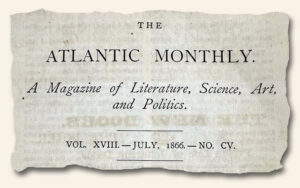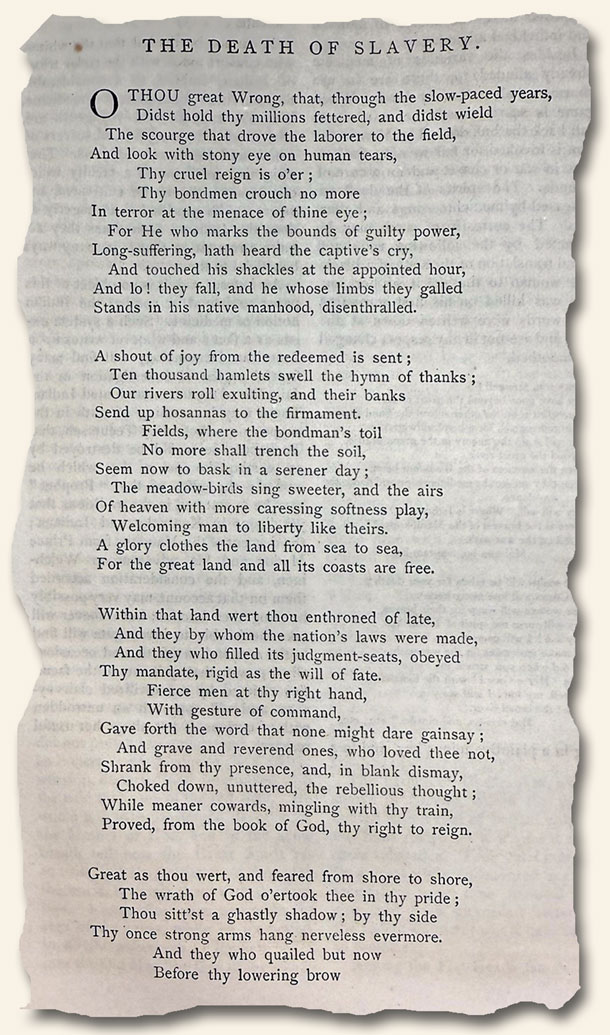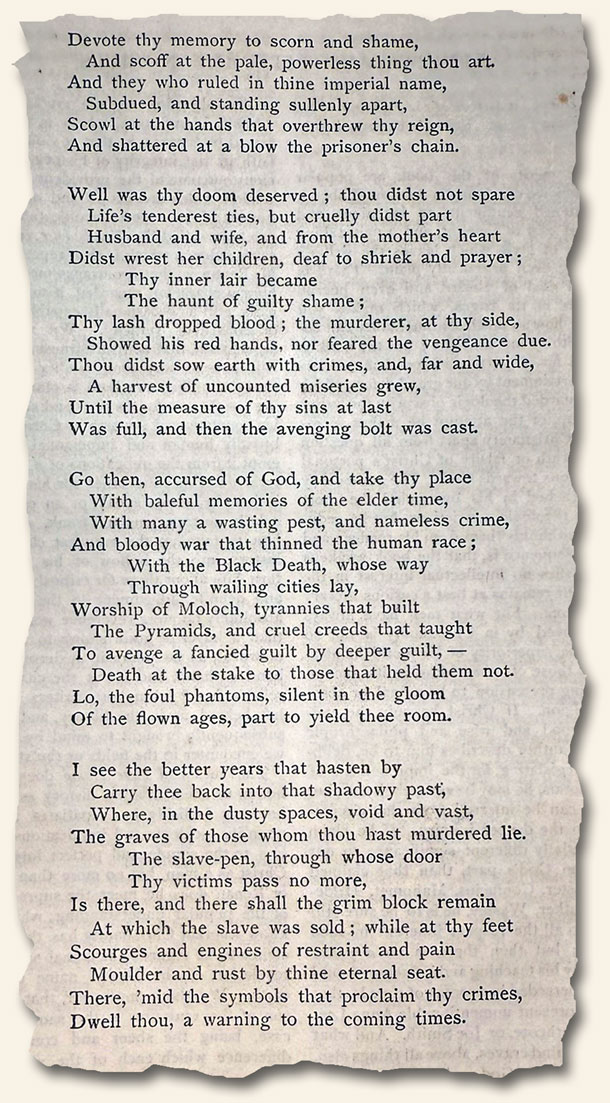Snapshot 1866 – Slavery: A Wound on the Soul of a Nation…
August 25, 2025 by GuyHeilenman · 1 Comment
 Few institutions in human history have inflicted more suffering or revealed deeper moral failings than slavery. Its cruelty was evident to many, even in its own time, and voices of conscience spoke out with clarity and passion against it.
Few institutions in human history have inflicted more suffering or revealed deeper moral failings than slavery. Its cruelty was evident to many, even in its own time, and voices of conscience spoke out with clarity and passion against it.
Frederick Douglass exposed the hypocrisy of those who justified such inhumanity in the name of religion:
“The man who wields the blood-clotted cowskin during the week fills the pulpit on Sunday, and claims to be a minister of the meek and lowly Jesus.”
Abraham Lincoln, never one to shy away from blunt truths, offered this biting reflection:
“Whenever I hear anyone arguing for slavery, I feel a strong impulse to see it tried on him personally.”
William Lloyd Garrison cut to the heart of the injustice:
“The slave is doomed to toil, that others may reap the fruits.”
And Harriet Tubman, who risked everything to lead others to freedom, distilled its evil to its core:
“Slavery is theft — theft of a life, theft of work, theft of any opportunity to shape one’s own destiny.”
While President Lincoln’s Emancipation Proclamation, issued on January 1, 1863, marked a turning point, the road to slavery’s demise was long, brutal, and soaked in the blood of those who fought to end it. The institution did not go quietly—it clung on with all its bitter force until finally it was defeated, leaving behind a scar but also a renewed hope for the American promise.
This complex and painful chapter was not lost on poet William Cullen Bryant. In 1866, just a year after the Civil War’s end, he shared his reflections in a powerful poem published in the July issue of The Atlantic Monthly. That poem, in its entirety, is presented below—a poignant reminder of what was endured, and what was overcome.

“The Compromise of 1850” – Daniel Webster’s costly plea for unity…
May 19, 2025 by GuyHeilenman · Leave a Comment
Whereas it is hard for those of us living today to imagine any “compromise” regarding slavery as a good thing (i.e., if it was wrong – and it was, how could anything less than abolishment be acceptable?), but the passionate antislavery politicians who lived through this era had to navigate the treacherous path between what they knew to right and the likely fracturing of what had increasingly become a fragile union. If they pushed too hard too fast, such a splintering would most assuredly result in an all-out Civil War with countless deaths, and if lost, the Southern institution of slavery would continue unabated by abolitionist sentiment. Even if it is agreed that an attempt at arriving at a compromise is in order, as with any deep-rooted, entrenched disagreement, any move to the middle requires someone to risk taking the first step.
 It is with the above in mind history declares Daniel Webster’s “Seventh of March Speech” as being pivotal in bringing both sides to a compromise. Although it cost this anti-slavery Senator from Massachusetts his reputation and career, all are agreed his multi-hour oration was instrumental in holding succession/war at bey for over 10 years (although it may have ultimately deepened the divide). We are thankful to have found a lengthy report in a New York Tribune (March 8, 1850) which included excerpts, paraphrases, and commentary on the speech.
It is with the above in mind history declares Daniel Webster’s “Seventh of March Speech” as being pivotal in bringing both sides to a compromise. Although it cost this anti-slavery Senator from Massachusetts his reputation and career, all are agreed his multi-hour oration was instrumental in holding succession/war at bey for over 10 years (although it may have ultimately deepened the divide). We are thankful to have found a lengthy report in a New York Tribune (March 8, 1850) which included excerpts, paraphrases, and commentary on the speech.
The following is the result of our research regarding its significance (Wiki, ChatGBT, Grok, etc.):
Summary of Daniel Webster’s “Seventh of March” Speech and Its Impact
Daniel Webster’s “Seventh of March” speech, delivered in 1850, was a heartfelt appeal for national unity and compromise amid escalating tensions over slavery that threatened to tear the United States apart. Webster declared, “I speak today for the preservation of the Union. ‘Hear me for my cause,’” emphasizing his alarm at the prospect of secession and civil war. He urged both the North and South to make concessions to safeguard the Union, a stance that significantly influenced the passage of the Compromise of 1850. However, this plea for moderation sparked widespread controversy and exacted a heavy toll on Webster’s career and reputation.
Key Points of the Speech
- Call for Unity: Webster positioned himself as an American, not merely a representative of Massachusetts or the North, advocating for the Constitution and the Union against the specter of disunion.
- Support for Compromise: He endorsed measures like the Fugitive Slave Law, hoping to bridge the divide between Northern and Southern interests and avert conflict.
Impact on Public Opinion
- In the North:
- Abolitionist Backlash: Northern abolitionists and anti-slavery Whigs felt betrayed by Webster’s support for the Fugitive Slave Law, which mandated their participation in returning escaped enslaved people—a stark departure from his earlier anti-slavery rhetoric.
- Regional Fallout: In Massachusetts, his home state, Webster’s reputation plummeted as he was branded a traitor to the anti-slavery cause, eroding his political base.
- In the South:
- Cautious Approval: Southern leaders appreciated Webster’s defense of the Fugitive Slave Law, seeing it as a gesture of respect for their rights under the Constitution.
- Lingering Distrust: Despite this, many Southerners remained wary of Webster due to his prior anti-slavery positions, viewing the Compromise of 1850 as a stopgap rather than a solution.
- Nationally:
- Passage of the Compromise: The speech rallied moderates across regions, providing Northern politicians with the justification to back the Compromise of 1850 without seeming disloyal to the Union.
- Deepened Divide: While it delayed immediate conflict, the speech underscored the irreconcilable differences over slavery, setting the stage for future strife.
Cost to Webster’s Career and Reputation
The “Seventh of March” speech marked a turning point that ultimately derailed Webster’s political career and tarnished his legacy:
- Northern Alienation: His endorsement of the Fugitive Slave Law alienated his Northern supporters, particularly in Massachusetts, where he lost the goodwill of abolitionists and anti-slavery advocates. This backlash effectively dashed his presidential ambitions.
- Incomplete Southern Acceptance: Although the South valued his compromise efforts, his earlier anti-slavery stance prevented him from fully gaining their trust, leaving him without a solid regional alliance.
- Political Isolation: Webster’s attempt to occupy a middle ground failed to heal the nation’s fractures. The Compromise of 1850, while a temporary success, only postponed the inevitable Civil War, and his role in it left him isolated as sectional tensions intensified.
Conclusion
Daniel Webster’s “Seventh of March” speech was a critical moment in American history, encapsulating both a desperate bid to preserve the Union and the profound challenges of compromise in a divided nation. While it facilitated the Compromise of 1850, it came at a steep personal cost, shattering Webster’s reputation in the North, limiting his influence in the South, and ending his political aspirations. The speech remains a poignant symbol of the era’s turmoil—a warning of division and a missed chance to confront slavery head-on.
Contribution from N.G. – Anson Burlingame’s historic 1856 speech…
April 4, 2025 by GuyHeilenman · Leave a Comment
 Many are familiar with the anti-slavery speech of Senator Charles Sumner which was greeted with his near-death caning (repeated blows from a walking stick) by Senator Preston Brooks was pro-slavery. However, I was not aware of Congressman Anson Burlingame’s fiery defense of Sumner’s position which is credited for being instrumental in galvanizing the pro-abolition resolve of Northern citizens. It is interesting to note how often good grows from the pain and suffering of adversity, suffering, and ill-intent. What Brooks intended to silence abolitionist views spawned quite the opposite.
Many are familiar with the anti-slavery speech of Senator Charles Sumner which was greeted with his near-death caning (repeated blows from a walking stick) by Senator Preston Brooks was pro-slavery. However, I was not aware of Congressman Anson Burlingame’s fiery defense of Sumner’s position which is credited for being instrumental in galvanizing the pro-abolition resolve of Northern citizens. It is interesting to note how often good grows from the pain and suffering of adversity, suffering, and ill-intent. What Brooks intended to silence abolitionist views spawned quite the opposite.
I am indebted to one of our collecting friends, N.G., who brought this historic speech to our attention. The full text was printed in several newspapers of the day, including the New York Daily Tribune dated June 25, 1856. Whereas a snippet is shown below, the text of his entire speech is available online.
Background (source – GROK):
The Burlingame Speech of 1856, formally titled “Defense of Massachusetts,” was delivered by Anson Burlingame, a U.S. Representative from Massachusetts, on June 21, 1856, in the House of Representatives. Its significance lies in its bold confrontation of the escalating tensions between the North and South over slavery, its defense of Northern principles, and its role in galvanizing anti-slavery sentiment during a pivotal moment in American history.
The speech was a direct response to the brutal caning of Senator Charles Sumner by Representative Preston Brooks on May 22, 1856, an event that shocked the nation and intensified sectional conflict. Sumner, a Massachusetts senator, had delivered an anti-slavery speech titled “The Crime Against Kansas,” which provoked Brooks, a pro-slavery Southerner from South Carolina, to attack him with a cane on the Senate floor. Burlingame’s address condemned Brooks’ actions as an assault not only on Sumner but on free speech, Massachusetts, and the broader cause of liberty. He described the attack vividly, stating that Brooks “stole into the Senate, that place which had hitherto been held sacred against violence, and smote [Sumner] as Cain smote his brother,” framing it as a moral outrage that transcended personal violence.
The significance of the speech is multifaceted. First, it marked a turning point in Northern resolve. Burlingame’s fiery rhetoric and unapologetic stance signaled that Northern leaders would no longer tolerate Southern aggression passively. He defended Massachusetts’ anti-slavery efforts, including its personal liberty laws that resisted the Fugitive Slave Act, and praised its role in opposing the spread of slavery into Kansas. This defiance challenged the South’s expectation of Northern compliance and asserted a willingness to fight for democratic principles.
Second, the speech had immediate political repercussions. Burlingame’s scathing denunciation of Brooks as a coward provoked a challenge to a duel, which Burlingame accepted. His choice of rifles and a location on the Canadian side of Niagara Falls—knowing Brooks would hesitate to travel through hostile Northern territory—forced Brooks to back down, enhancing Burlingame’s reputation as a fearless anti-slavery advocate. This episode amplified the speech’s impact, turning Burlingame into a Northern hero and further polarizing the nation.
Finally, the speech contributed to the growing momentum of the Republican Party and the abolitionist movement. Delivered at a time when the nation was fracturing over slavery, it rallied Northerners to the cause of freedom and democracy, reinforcing the idea that the conflict was not just about policy but about fundamental values. Historians note that it resonated widely, with one observer calling it “the most celebrated speech” of Burlingame’s career, reflecting its emotional and political resonance.
In summary, the Burlingame Speech of 1856 was significant for its bold stand against Southern violence, its defense of Northern ideals, and its role in mobilizing anti-slavery sentiment, making it a key moment in the lead-up to the Civil War.

More than just another anti-slavery newspaper… A recent find…
February 7, 2025 by TimHughes · 2 Comments
I would have thought that after roughly a half-century in this hobby I would have heard of almost every title in America, even if I never owned them. But recently we encountered some issues of “The Non-Resistant” from Boston. Certainly the title intrigued me.
Wikipedia does a nice job of describing it:
“The New England Non-Resistance Society was an American peace group founded by William Lloyd Garrison (publisher of the famous ‘Liberator’ newspaper) in 1838. At the organizing convention, members of the American Anti-Slavery Society & the American Peace Society expressed discomfort with Garrison’s philosophy of non-resistance & inclusion of women in public political activities. After conservative attendees opposing Garrison walked out of the convention in protest, those remaining formed the ‘New England Non-Resistance Society’. The Society condemned the use of force in resisting evil, in war, for the death penalty, or in self-defense, renounced allegiance to human government, and because of the anti-slavery cause, favored non-union with the American South.
The Society condemned the use of force in resisting evil, in war, for the death penalty, or in self-defense, renounced allegiance to human government, and because of the anti-slavery cause, favored non-union with the American South.
The New England Non-Resistance Society was one of the more radical of the many organizations founded by William Lloyd Garrison, adopting a Declaration of Sentiments of which he was the principal author, pledging themselves to deny the validity of social distinctions based on race, nationality or gender, refusing obedience to human governments, and opposing even individual acts of self-defense.
In the Society’s Declaration of Sentiments, Garrison wrote, ‘any person without distinction of sex or color, who consents to the principles of this Constitution may become a member and be entitled to speak at its meetings.’ The Society rejected loyalty to any human government; one historian has described the Non-Resistance Society’s ‘basic outlook as that of philosophical anarchism’.
The declaration was signed by 44 people, of whom 20 were women. Maria Chapman became the editor of its publication, The Non-Resistant, along with Edmund Quincy and William Lloyd Garrison and started publication in 1839. The publication lasted only several years but was indicative of the millennial character of parts of the reform movement.”
An interesting newspaper with an intriguing history. I should never be surprised by what comes our way.




